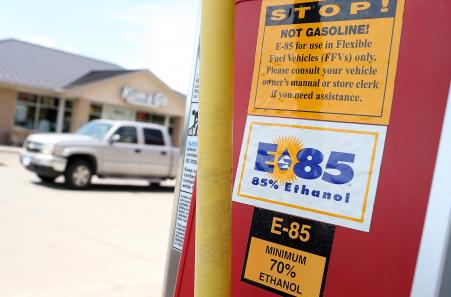By Maria Gallucci -

U.S. regulators this week cut the requirements for how much corn ethanol and advanced biofuels must be mixed into the country’s gasoline and diesel supplies. The decision comes after years of falling motor fuel demand, which, along with other factors, is limiting the ability of ethanol suppliers to meet the original goals of the government's alternative fuel requirements.
The Environmental Protection Agency said Monday that fuel companies must blend 18.11 billion gallons of corn ethanol and other biofuels into gasoline next year. The target is higher than the 17.4 billion gallons the EPA proposed in May, but well below initial levels set under the Renewable Fuel Standard (RFS). The agency also retroactively reduced requirements for 2014 and 2015.
The adjustments to RFS drew mixed reactions from the U.S. Farm Belt, which supplies the bulk of the country’s biofuels. Shares in ethanol companies jumped Monday in response to the smaller reductions, the Wall Street Journal reported. Shares of Green Plains Inc., one of the biggest U.S. ethanol producers, rose 5 percent after the EPA released its numbers. Shares in Archer Daniels Midland Co., the country’s biggest ethanol producer by volume, edged up 0.1 percent, while stock in smaller Pacific Ethanol Inc. surged 21 percent.
“The EPA volumes announced today are a move in the right direction,” Jeff Broin, CEO of Poet LLC, a large ethanol producer in South Dakota, told the Journal. “However, these numbers fall well short of our capability to provide clean, domestic ethanol to America’s drivers.”
Biofuels represent about 10 percent of total gasoline consumption, with the bulk of those volumes coming from corn ethanol.
Jim Talent, a former Republican U.S. senator from Missouri and chairman of pro-ethanol group Americans for Energy Security and Innovation, said the Obama administration’s “lackluster standards” threaten the 850,000 jobs and billions of dollars in investment in the U.S. ethanol and biofuels sectors. The adjustment “flies in the face of the intent of the U.S. Congress when it passed the law and undermines the only successful federal law that has effectively promoted clean, American-made alternatives to foreign oil,” Talen said in an emailed statement.
Congress established the RFS under a sweeping 2005 energy law and significantly expanded the standard’s scope two years later. The rule requires the EPA to set annual volume requirements for corn ethanol and other biofuels, in an effort to displace petroleum-based gasoline and diesel, reduce greenhouse gas emissions and lower the country’s dependence on foreign oil.
But regulators set the standard’s initial limits at a time when U.S. fuel imports and domestic gasoline use were expected to soar in coming years, thus signaling a greater need for alternative fuel products. But that didn't happen. The U.S. shale oil boom helped push crude imports down 20 percent between 2010 and 2014, while gasoline consumption has slipped since record highs in 2007 as Americans switch to fuel-efficient cars and drive fewer miles.
Production of cellulosic ethanol -- including supplies from plant waste or algae -- has lagged, while many states still lack infrastructure to blend biofuels into gasoline, according to the EPA. The agency used a “waiver” provision within the law to issue lower volume requirements than those initially established in the law.
Along with the 18.11 billion gallons of ethanol, the updated 2016 standard requires fuel suppliers to mix in nearly 200 million gallons of cellulosic ethanol, or about seven times higher than actual production in 2014. Suppliers must also include 3.6 billion gallons of advanced biofuels, nearly 1 billion gallons more than what the market produced in 2014. Biodiesel standards ticked up slightly to 1.9 billion gallons, from a requirement of 1.63 billion gallons in 2014.
